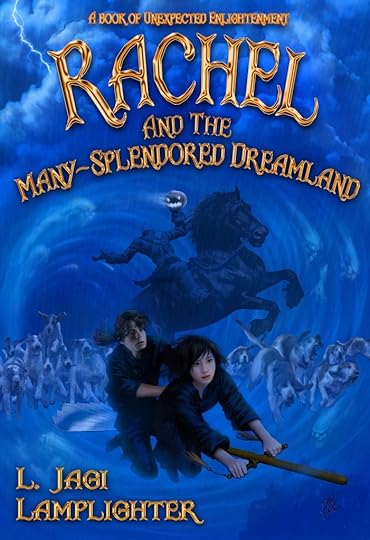L. Jagi Lamplighter's Blog, page 13
September 5, 2016
The Prude and The Trollop
Occasionally, I come upon a review (there has been more than one) of The Unexpected Enlightenment of Rachel Griffin where the reader threw the book across the room and stopped reading at the scene in Chapter Four where crazy orphan boy Sigfried Smith encounters a young woman deliberately wearing too-tight clothing to flaunt her curves and uses the word (brace yourselves, my dear readers) trollop.
These reviewers universally agree: clearly the author (not the character, mind you) must be a disapproving prude out to slut-shame all well-endowed girls.
This is obvious, because the "trollop's" name is Salome Iscariot–which no author in their right mind would give to a character who was not a villainess. So don't read her book. Because, you know, evil.
Except…
Salome Iscariot is not a villain.
So, to put to bed any rumors that Salome Iscariot is not adored by her author, here is an excerpt from the soon-to-be-released Third Book of Unexpected Enlightenment: Rachel and the Many-Splendored Dreamland.
 .
.
Valerie Hunt and her best friend, Salome Iscariot
From: Rachel and the Many-Speldored Dreamland
Chapter Twenty-Eight:
Though the World May Burn
“Eeevil! I told you he was evil!” Salome arched her back into a bridge atop a table in the Storm King Café and raised one leg, pointing her toe toward the ceiling. Her skirt slipped down revealing her black-tights-clad thigh. She pursed her deep red lips. “Vladimir Von Dread is sooo evil! Not that I object to him anymore, mind you. He’s actually kind of cool, not to mention brain-stunningly gorgeous, but…conqueror of sixty-five worlds! Totally eeeeevil!”
Siggy’s eyes grew huge, fixed on the shapeliness of her inner thigh. A happy dreamy look came over his face. Then, yanking his gaze away, he grabbed a fork off the table and stuck it into his own thigh until he grunted with discomfort.
“Um, Miss Iscariot,” Siggy raised his palm to form blinders, blocking his view of the young lady. “I don’t mean to sound critical, but this may not be the best place for a display of modern dance. Right, Lucky?”
“I don’t know,” Lucky cocked his head to one side and then the other, “maybe it’s a mating dance. You should bite her on the back of her neck and drag her off to the harem cave. Do you have the hot volcanic sands ready for the eggs?”
“Lucky,” Sigfried replied sternly, “I have explained to you about no harems.” He leaned over and put his arm around Valerie, who rolled her eyes. “Miss Iscariot may be eye-burningly attractive, but I am a one-woman man.”
“I am with Mr. Smith, Miss Iscariot. Perhaps this is not the best venue to appear so unclad,” murmured the Princess, who sat at the same table as Siggy, sipping her tea. Her Tasmanian tiger sat regally beside her.
“Oh you people. You’re such prudes.” Salome flipped her legs over her head and landed lightly on her feet on the floor. She spread her arms. “Ta-da!”
She adjusted her skirt with lackadaisical slowness. The older boys at the far table were not as chivalrous as Sigfried and watched the whole thing with prurient interest. She turned and gave them a languid, smoky glance over her shoulder.
“Does your boyfriend mind you doing that?” Rachel asked, thinking with pleasure of the moment, during the Knight’s dueling period, when she had bested Salome's boyfriend, the handsome and arrogant Ethan Warhol.
“What can he do about it?” Salome shrugged her shoulders in a fashion pleasing to the upperclassman boys. “If he wants the gorgeous lusciousness that is me,” she made a cute, cheerful gesture, ending with both her hands—and her flaming pink and fire-truck red nails—pointing at her face, “my entourage of lust-maddened boy-toys is part of the package.”
The Prude and the Trollop
http://arhyalon.livejournal.com/403160.html?mode=reply#add_commentOccasionally, I come upon a review (there has been more than one) of The Unexpected Enlightenment of Rachel Griffin where the reader threw the book across the room and stopped reading at the scene in Chapter Four where crazy orphan boy Sigfried Smith encounters a young woman deliberately wearing too-tight clothing to flaunt her curves and uses the word (brace yourselves, my dear readers) trollop.
These reviewers universally agree: clearly the author (not the character, mind you) must be a disapproving prude out to slut-shame all well-endowed girls.
This is obvious, because the "trollop's" name is Salome Iscariot–which no author in their right mind would give to a character who was not a villainess. So don't read her book. Because, you know, evil.
Except…
Salome Iscariot is not a villain.
So, to put to bed any rumors that Salome Iscariot is not adored by her author, here is an excerpt from the soon-to-be-released Third Book of Unexpected Enlightenment: Rachel and the Many-Splendored Dreamland.
 .
.
Valerie Hunt and her best friend, Salome Iscariot
From: Rachel and the Many-Speldored Dreamland
Chapter Twenty-Eight:
Though the World May Burn
“Eeevil! I told you he was evil!” Salome arched her back into a bridge atop a table in the Storm King Café and raised one leg, pointing her toe toward the ceiling. Her skirt slipped down revealing her black-tights-clad thigh. She pursed her deep red lips. “Vladimir Von Dread is sooo evil! Not that I object to him anymore, mind you. He’s actually kind of cool, not to mention brain-stunningly gorgeous, but…conqueror of sixty-five worlds! Totally eeeeevil!”
Siggy’s eyes grew huge, fixed on the shapeliness of her inner thigh. A happy dreamy look came over his face. Then, yanking his gaze away, he grabbed a fork off the table and stuck it into his own thigh until he grunted with discomfort.
“Um, Miss Iscariot,” Siggy raised his palm to form blinders, blocking his view of the young lady. “I don’t mean to sound critical, but this may not be the best place for a display of modern dance. Right, Lucky?”
“I don’t know,” Lucky cocked his head to one side and then the other, “maybe it’s a mating dance. You should bite her on the back of her neck and drag her off to the harem cave. Do you have the hot volcanic sands ready for the eggs?”
“Lucky,” Sigfried replied sternly, “I have explained to you about no harems.” He leaned over and put his arm around Valerie, who rolled her eyes. “Miss Iscariot may be eye-burningly attractive, but I am a one-woman man.”
“I am with Mr. Smith, Miss Iscariot. Perhaps this is not the best venue to appear so unclad,” murmured the Princess, who sat at the same table as Siggy, sipping her tea. Her Tasmanian tiger sat regally beside her.
“Oh you people. You’re such prudes.” Salome flipped her legs over her head and landed lightly on her feet on the floor. She spread her arms. “Ta-da!”
She adjusted her skirt with lackadaisical slowness. The older boys at the far table were not as chivalrous as Sigfried and watched the whole thing with prurient interest. She turned and gave them a languid, smoky glance over her shoulder.
“Does your boyfriend mind you doing that?” Rachel asked, thinking with pleasure of the moment, during the Knight’s dueling period, when she had bested Salome's boyfriend, the handsome and arrogant Ethan Warhol.
“What can he do about it?” Salome shrugged her shoulders in a fashion pleasing to the upperclassman boys. “If he wants the gorgeous lusciousness that is me,” she made a cute, cheerful gesture, ending with both her hands—and her flaming pink and fire-truck red nails—pointing at her face, “my entourage of lust-maddened boy-toys is part of the package.”
September 3, 2016
What Boys Read.
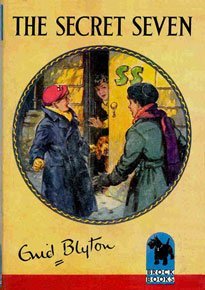
Insightful post by Vox Day on "What Men Read" or, more precisely, what boys read.
What is funny is that, when I was younger, I would not have thought it was insightful. I would have thought it was obvious. Everyone knew what kind of stories boys liked to read: action, adventure, exciting.
But, I think some people have forgotten. Vox does a nice job of putting what has been forgotten into words.
What Men Read
I was doing an interview a few weeks ago for Women of Bad Asserywhen I started to wonder if it was actually true that men – and young boys – refuse to read books written by women or starring women. It wasn't actually hard to disprove it – JK Rowling may have used her initials to hide her gender, or so I have been told, but I read quite a few other books by women when I was a child. The gender of the writer alone had no influence on me. Nor too did I automatically dismiss a book starring a girl.
What did have an influence was school. The vast majority of the books I was forced to read at school were boring. Teachers – both male and female – would select books that bored me to tears. Thankfully, by then I already had the reading bug. Boys who didn't, who only knew reading as a chore, didn't read when they didn't have to read. They found it a tedious process – and preferred watching television instead.
So … what did all the books I liked have in common?
Most of them featured adventure. The characters would be pitted against a remorseless enemy or given a task to do. It didn't really matter if the task was large or small, a thinking enemy or a force of nature; all that mattered was the challenge, the urge to overcome and triumph over one’s circumstances. The characters didn't simply exist, the characters had something to do.
Harry Potter works, at least for the first five books, because it fits neatly into this pattern. Harry escapes the mundane world and flies straight into a world of magic, but gets pitted against a string of deadly foes. All of his books feature Harry being challenged – Goblet of Fire being the most dramatic example – and overcoming his challenges. Everyone who wants to argue that Dumbledore is a poor headmaster because Harry has to deal with the problem-of-the-book is missing the point. The series works because Harry is the one who deals with the problem.
This is true for a lot of my childhood favourites. The Famous Five and The Secret Seven all feature mysteries that have to be solved. Hood’s Army and The Demon Headmaster all feature battles against deadly enemies. And all of them are exciting reflections of the way young boys think. They want adventure.
August 30, 2016
Swan Knight’s Son!
Swan Knight's Son, the first of the three books of Green Knight's Squire, which is the first of four Tales of Moths and Cobwebs, has been released.
This delightful tale of a young man who choses to become a knight…despite that knights are not really in high demand in modern America…is my favorite so far of the things John has written.
Also, it has a talking dog.
An excerpt:
Gil Moth, a 16 year old boy living in the South, has just had a bad day. He is sitting on the side of the road, glum. We do not know why it is that he can understand animals:
Ruff came trotting up, with a dead squirrel in his mouth. The dog laid the squirrel carefully in the gutter at Gil's feet, and sat back, bright-eyed and wagging his tail, and he barked. "Look! Look! I brought a squirrel! A squirrel!"
Gil folded the newspaper, and threw it down into the gutter.
Ruff said, "Hi! Hi! You can eat it. I brought a squirrel you can eat!"
"Thanks, Ruff. You are a pal. Good dog. You are a good dog!" And he scratched the dog behind the ears.
Ruff sniffed the newspaper, and his ears drooped. The tail stopped wagging. Ruff looked up with a mournful expression into Gil's face. "Oh no! Oh no! It is a day of failure. You failed. Didn't find what you were hunting, did you?"
"How did you know?"
"I can smell failure."
Gil looked up. "Really?"
"Yup! Yup! Well, and there is also the fact that you are sitting in the gutter looking glum rather than flipping burgers or changing tires."
"There was one guy, who wanted to hire me for carpentry. I showed him I knew how to pound a nail and hang a door. Another guy at the shooting range needed someone to clean the guns, mind the customers, lock up at night. Even the car wash needed someone. But not me. I am not in the union, not old enough, don't have a birth certificate. Cannot prove I am allowed to work. The old lady who runs the flower shop wanted someone just to sweep up the place, pick up dead petals and leaves, take out the trash, but she said she could not pay me ten bucks an hour. I said I would work for half of that. She said she was not allowed to pay me so little. Not allowed! In her own store! Who has the right to tell her she can't hire me?"
Ruff jumped up, his ears high, "Oh! Oh! I think you should sneak into her shop at night, and do all the work she wants without telling anyone! Then, if she likes the work, she will leave a bowl of cream out on her back doorstep for you. And on All Hallows, she has to sew you a new suit of clothing. And then you vanish and never come again."
Gil said, "What?"
Ruff's ears drooped again. "Oh no! I thought that is how things like this were done."
"Maybe in Dog Land. The way they are done in Burke County is less exciting. If you stand on the corner at the library, sometimes landscapers will come by to pick you up for a day's work with a shovel or a rake. But Mom said honest labor. Does honest labor mean I have to obey laws about carrying paperwork and being old and whatever else? Because that I am not allowed. Or does it just mean your full effort for a full day with no slacking and no backtalk? That I can do."
Ruff said, "Hey! I have an idea! Why not go to Dog Land?"
Gil looked at the mutt in surprise. "Is there really such a place?"
Ruff cocked his head to one side, so one ear was up, the other down. "Um! Um! You just said. You said how they do things in Dog Land. I thought it sounded like a swell place. Swell! Because of the dogs."
August 16, 2016
When Can We Murder Grandma?
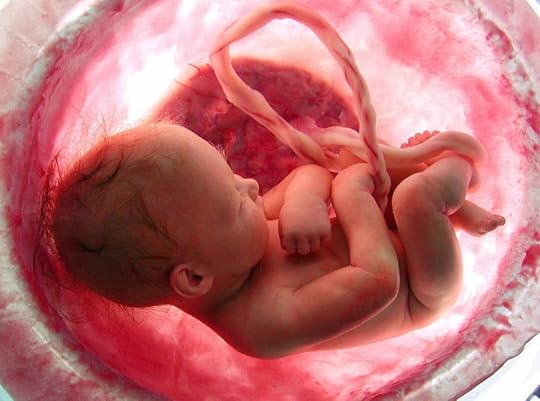
Not a human
Many years ago, I was driving down the highway, from North Carolina to Maryland, in the company of a friend, with whom I was secretly in love, and we were discussing abortion.
I had told him my stance. I was very pro-abortion. (I realize that, since then, someone came up with cute little terms “pro-life” and “pro-choice”, but this was before that. We still called it pro-abortion and anti-abortion.)
My reasons were as follows:
I believed that all life was sacred, that to kill would be to break a commandment. I believed that this was in direct disobedience to the will of God. So, I personally would never have an abortion.
BUT, I felt I had made this decision on religious grounds. Thus, abortion should be legal so that everyone could make their own decision based on their own religion.
I felt very strongly about this. So strongly that I had voted a pro-abortion ticket one year.
I felt this was about defending religious freedom.
But, as I chatted about the issue with my friend, he brought up the word murder.
“Abortion’s not murder!” I scoffed.
But I was a bit unnerved. Never had I before heard abortion referred to as murder.
“Murder is the unlawful killing of a human being,” quipped my legal-minded friend, who was an atheist just out of law school. He then listed the times when it is lawful to kill a human being: self-defense, defense of others.
Laws in favor of abortion, he pointed out, did not make it lawful to murder a human being. They merely defined an unborn child as “not yet a human being” and, thus, not covered by these laws.
I countered by explaining how, sometimes, a young woman’s whole life would be ruined by having a baby—both the mother’s and the child’s life would be miserable.
If the mother has an abortion and waits to have a child until she is older and settled, all will be much better. For everyone.
These were not idle words to me.
A good friend had been raped and had an abortion. (I would say ‘decided to have an abortion’ but later I found out she was more pushed into it.)
A good friend had gotten pregnant. The father was a boyfriend who was younger than her…too young to legally marry. She was bright but came from a difficult background. Had she decided to keep the child, everything in her life would have been thrown out of whack. She didn’t even have a place to stay.
Despite my personal objections to abortion—my personal religious views—I had gone with her to the clinic, so she would not be alone.
So, I did not speak idly when I talked of the cost to the lives of young women, should they chose to keep their babies.
My legalistic, atheist friend—who didn’t care one way or the other about abortion—countered thoughtfully with something like, “It’s a huge burden to have to take care of your aging grandmother. Some people’s lives are financially ruined by such burdens.
“Should we be able to kill our senile old grandparents?”
It was like being struck by lighting.
Because, of course, the answer was no.
Not even if it would be really, really convenient were we allowed to murder another human being.
So, why was having a baby different?
The baby would at least eventually grow up and live on its own. One’s aging relatives might never recover, and yet…
There was no argument by which doing away with unwanted human beings was not murder.
So…why was abortion different?
It took my fifteen years to make up my mind about this question and come to the conclusion that I had been wrong to be pro-abortion.
Now, you might ask: why did it take so long?
Simple question, right? Murder is wrong? How could you take so long to grasp that?
Because of my friend—the one whose hand I had held at the clinic, the one who had been raped, and others.
I felt that if I took a stand against abortion, it would be like betraying them.
And I didn’t want to let them down.
Eventually, however, I realized: We don’t do our friend any service by telling them that something is okay if it is not okay. That is not friendship.
That is cowardice disguised as friendliness.
But I also feel that taking a stand against something that is wrong does not mean that we have to be rabid about it.
I don’t have to call my friends and brow beat them about their past bad choices. Or even think badly of them for the choices they made with the best wisdom they have at the time.
After all, at the time, I approved, too.
On the third hand, allowing more children to be murdered because of not wanting to condemn the mistakes of the past is not good either!
Because killing human beings does something to our souls.
Once you dehumanize other humans, things go wrong in other parts of your psyche.
Once it is okay to kill a clump of cells, what about through the first three months?
What about right before the baby is born?
What about after it’s born? You can find papers on the Internet saying that a born baby isn’t so different from an unborn one, so we should be able to kill it, too.
There is something very, very wrong with that argument!
Did you know that for late term abortions they have, at times, turned a baby around, during labor, so that they can kill it as it comes out.
Because, according to the current crazy lawsin some states, if the head is still inside the mother, it’s not human and can be torn apart with scissors or stabbed in the brain. While, if the head comes out first, and the feet are still in, it’s human, and cannot be killed.
There is something very, very wrong with that, too.
.And the methods for killing it involve scissors—on a baby who would be alive and breathing, if they waited a few minutes.
Can you imagine if it were legal to buy kittens and puppies and keep them while they were cute and fuzzy, but the moment they grew into dogs—we were allowed to cut they apart or stab them in the head with scissors?
Without any painkiller?
But that is not legal. We have laws against cruelty to animals.
If we, as a culture, know better than to treat animals in such a fashion, shouldn’t unborn human beings—with the potential to be just like you and me—be granted at least the same rights?
The advantage of not dehumanizing human beings—not killing them at any state, born, unborn, grandma or grandchild, young or old, sick or well—is: if our laws protect humans, even the marginal ones, they will stand strong.
Human beings will be protected.
The moment we start chipping away at the strength of the law to protect human life, we are all in danger.
You think not? You think we can keep just a few types of humans dehumanized and protect the rest?
It used to be that abortions were supposed to be safe and rare. That was the rallying cry of the DNC. “Abortion is a tragedy, but sometimes it is a necessary tragedy.”
This summer, the crowd at the DNC cheered an abortion.
They cheered because a baby had been murdered.
***
Run, Grandma, they'll be coming for you next!
August 12, 2016
Pokemon, Go!

At Boy Scout camp, we had no reception. To use the Internet, we had to go to a narrow span of space inside the staff lounge and stand on one foot while leaning to the north, which was the only place the WIFI worked. I did this once a day to check my email, and, occasionally, I looked at a newsfeed to see if the outer world was still there. It was here, while balanced precariously in a northerly direction, that I saw the headline:
Pokemon Go More Popular Than Porn.
This was my introduction to Pokemon Go.
At first, I confused this with Pokemon Sun and Moon, the new DS game my kids have been waiting for. It took a little while before I realized that this was, actually, something new. Very new.
This was like nothing that had ever been done before.

Ash Ketchum gets off to a rocky start
but almost two decades later, he's still going strong!
A bit of history:
My first encounter with Pokemon was, well, probably before you heard of it.
Back in the late 90s, I wrote for a briefly-existent magazine called Animefantastique. It was put out by the folks that publish Cimemafantastique magazine. They wanted to cover anime for the American audience, but maybe they started too soon, as it was not yet as big as it would be a few years later. So the magazine did not last long. My last article for them did not even get published.
My last article was on this new-fangled thing called Pokemon.

A scene from the very episode my sister-in-law translated for me
So early in the Pokemon phenomena was this that, in order to review the TV show, I had to get my Japanese sister-in-law to translate an episode. It had not yet been released in English. This was before the release of the first movie, which came out in 1999, I believe.

This movie introduced Mewtwo.
Mew is cuter.
As part of my article, I interviewed the head of 4Kids Entertainment, the company that was bringing Pokemon to American. In the conversation, I asked him if he thought that Pokemon might make a big splash and be popular for a year or two. He told me that a year or two was nothing. Shows like Power Rangers and Teenage Ninja Mutant Turtles had maintained their popularity for four or five years. 4Kids had high hopes.
Turns out, they were right! More right than any of us could have foreseen!
(Including them. Apparently, in 2005, 4Kids did not renew their contract to be the American distributor of Pokemon. Maybe they thought the fad was over. Poor guys.)
Then, when my eldest son was three, his godfather lent him 72 episodes of Pokemon. Almost the first two seasons, I think.
It was love at first view!
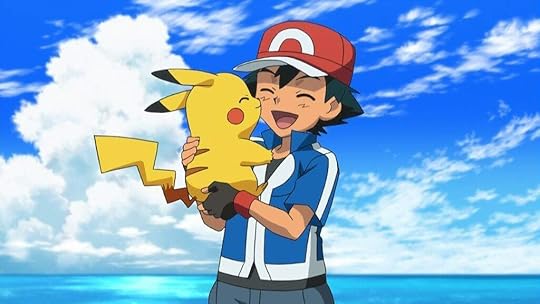
Love at first sight–unlike Ash and Pikachu,
who did not get along at first.
I remember the day I heard pitiful wailing coming from downstairs. I ran down. My three-year-old was in tears. Rushing to his side, I could find no injury. Eventually, the mainly-pre-lingual boy (he learned to talk quite late) was able to communicate to me:
Butterfree had gone away.
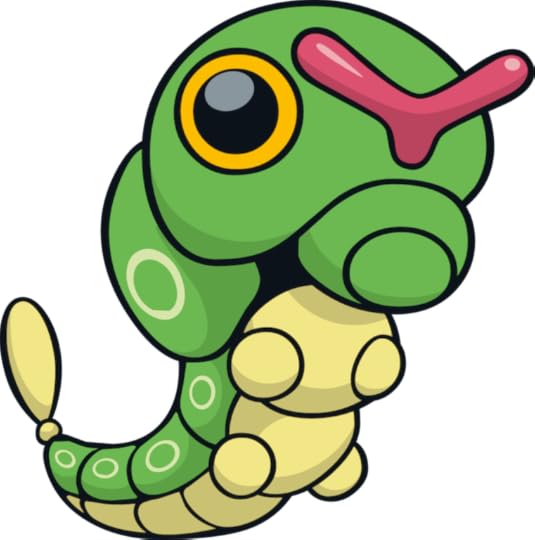
Caterpie!
Ash's first catch.
In the TV show Pokemon, ten-year-old Ash Ketchum’s first Pokemon catch, after he and Pikachu set out on their Poka-journey, was a Caterpie. Caterpie evolved into Metapod, who has the ultimate technique of harden, as in hardening its cocoon-like outer shell.

“Harden, Metapod! Harden!”
But I digress.
Metapod then evolved into Butterfree, a cool butterfly pokamon who could do actually effective attacks, like put people to sleep. Eventually, however, the day came when Butterfree was mature enough that it was its time to go off with a flock of other Butterfrees, to do whatever Butterfrees do that lead to little Caterpies.
So Ash had to let his very first catch go.
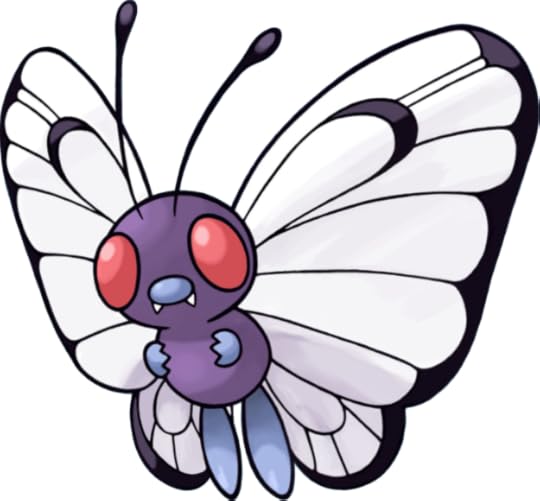
And my three-year-old son cried.
It was the first time he had ever been upset by something that was not a concrete problem. I was impressed that he was able to comprehend the sadness of the scene enough to be upset by it. It showed he was growing up.
What followed was a childhood steeped in Pokemon.

According to some…this is the best Pokemon of all
My sons watched the show. They hummed the song. They played the card game. (I won’t even tell you how much I spent on cards one summer. Or about the time that the neighbor’s kid tricked my four year old out of the most expensive card we owned. I stormed right over there and got it back.) They played with toys (many of which they inherited from their cousins, so they were straight from Japan.)
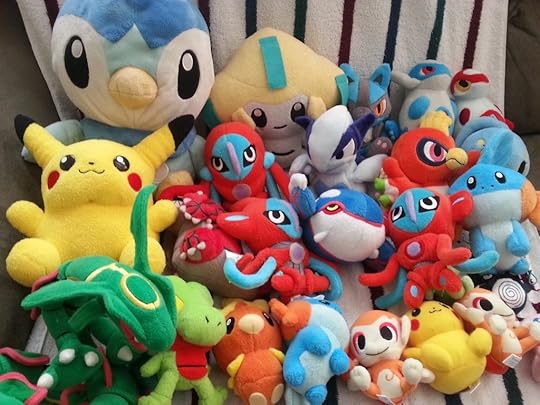
Not our house…but it could be.
Eventually, they even played the video game.

Iced poka ice cream cake.
We even had Pokemon birthday parties. In the Pokemon TV world, kids leave on their poka-journeys at ten. So both of the talking boys got a Pokemon party for their tenth birthday. I planned Orville’s for a whole year, buying cute plushy pokamon dolls, so that every kid got to unwrap one from pokaball colored paper and take it home. I even made a pokaball ice cream cake.
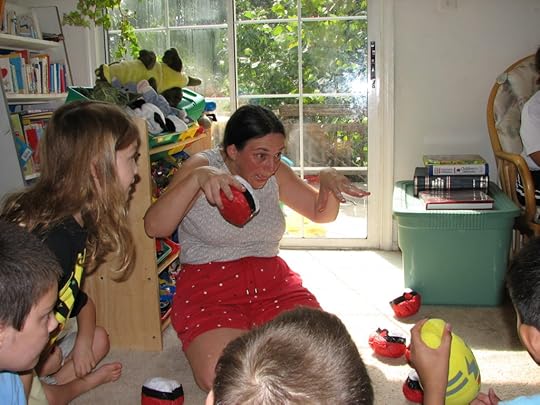
Holding a pokaball — maybe not my best picture.
By Juss’s tenth birthday, I had even found plastic clear and red spheres, that looked like pokaballs to put the plushies into. We went out hiking through the local forests, pretending to spot pokemon, and running off to catch them.
You could say that we played Pokemon Go before it was cool

Catching Pokemon before it was cool.
Note the riolu in hand.
They lived and breathed Pokemon.
It changed our life.
Orville even invented his own world (Eddaria) with his own version of Pokemon (W-Beasts, short for War Beasts), which he still works on, even today.
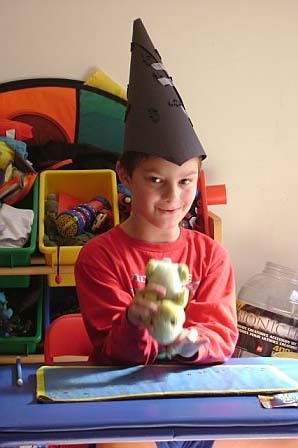
Young magician and his assistant, Turtwig
So, when I read that they had come up with a way to make it so that kids could go outside and catch Pokemon on their own, by combining a video game with GPS geocaching, I thought:
Brilliant. Absolutely brilliant.
Then, the stories started pouring in.
First the horror stories: Two people walked off a cliff and were badly injured trying to catch a Pokemon. Someone got pulled over by the cops for speeding—trying to catch the Pokemon you could only catch at 88 miles per hour. People walking into traffic without paying attention.
But then came the good stories.
People getting out of the house. People going to seminaries and churches. One seminary had a Pokemon Go event and reported six conversions.
Bestselling author John Ringo wrote a very touching piece about the way that getting out and hunting Pokemon changed his health and his life.
There are even dog shelters that that will let your walk their dogs while you play (so you don’t look too stupid out there on your own. Helps the dogs, too.)
But the people who are the happiest are young men, a bit like my sons, who grew up with Pokemon, watching it, playing the card game or the video game—watching someone else journeying around to capture pokamon.
And now, they can do it themselves.
The joy on the faces of young men in their twenties who I have spoken to about this game…I’ve almost never seen anything like it.
And to hear modern young geeks talking about the hours spent hiking or the distant they have biked.

Exercising geeks. Almost a miracle, in and of itself.
The first thing my kids discussed when they heard about the game was how long you could keep it interesting. Pokemon Go has about 150 pokamon, but currently there are something like 721 pokemon in the game/TV background.
That promises a lot of later releases.
“And then they could introduce breeding,” said my younger son, who has spent serious amounts of time trying to breed Pokemon on his DS to get just the one he wanted.
Being able to both walk out and catch pokamon…and get new varieties by breeding the ones you catch with people you meet on the street…that has potential.
And then, there is Team Rocket. Who would not want virtual spies stealign their hard-won Pokemon. Not to mention that Giovanni could easily use Pokemon Go to carry out his plan of world domination!

Pokamon are everywhere. The president of Isreal had to call for security when this member of Team Rocket showed up in his office.
Giovanni even cries out "Go! Go!" in his theme song. Clearly he forsaw Pokemon Go over a decade ago!
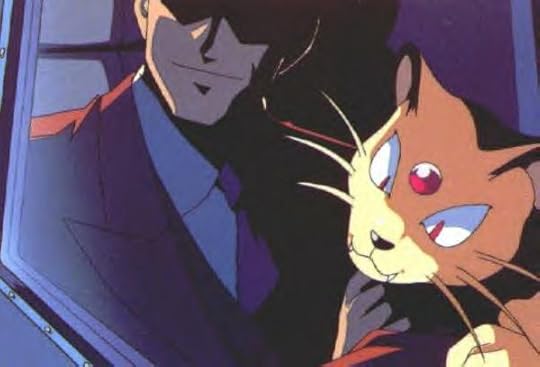
Giovanni of Team Rocket.
His theme song is one of my favorite songs. Cool lyrics:
"I was born to rule the world.
…
"There'll be world domination, complete obliteration
"of all who now defy me!
…
"It will all be mine, power so divine
I will tell the sun to shine
On only me!"
Oddly, my kids are not interested in Pokemon Go. Probably because they don’t have smart phones. But I suspect it is just a matter of time. Sooner or later, someone in the house will get a hold of the game, and a new chapter of Pokmeon adventures will enter our lives.

Gotta Catch Them All!
August 1, 2016
“A Little Touch of Harry In The Night”
Spoiler free musings on the release of Harry Potter and the Cursed Child
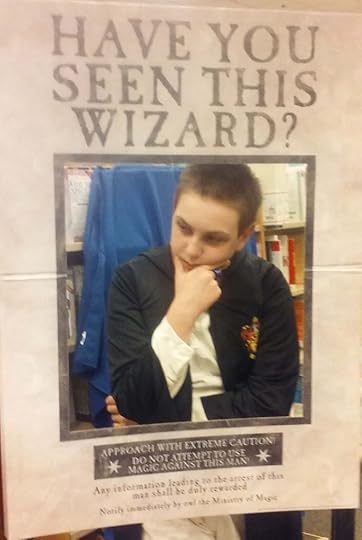
The Elf King contemplates his life of wizardly crime.
Saturday night, standing between the trolley witch’s cart and the wand maker, surrounded on all sides by charm and wonder that was the world of Harry Potter, I couldn’t help recall how I had come to be there.

The first time I ever heard of Harry Potter was nearly two decades ago. John had been reading an article that mentioned complaints about some “overly-masculine” book from England, where children characters still punched each other.
Some months later, I walked into Barnes and Nobles, and they had a display showing a rather charming book cover. The title of the book had the boy’s name in it. It reminded me of Encyclopedia Brown, Tom Swift, and other books John had loved as a boy. I called him over and showed it to him. His face lit up. “That’s the book I told you about!”
The title was: Harry Potter and the Sorcerer’s Stone
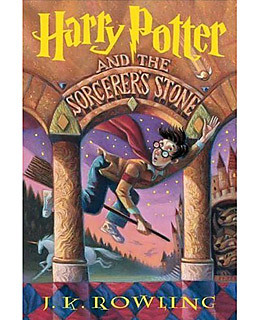
Doesn't the cover even look like one of those old boys adventure books?
The title made me smile, because it reminded me of the Philosopher’s Stone (Little did I guess that it actually was Harry Potter and the Philosopher’s Stone, only they’d dumbed it down for Americans.)
“Let’s get it.”
We read it to each other on our Christmas trip to John’s mom’s. We LOVED it.
It was entirely enthralling. It had the cheer and the wonder of a fairy tale, but the concreteness of the modern—or at least semi-modern day. There was a lonely orphan boy and a talking snake. A friendly giant who told the lonely boy that he was a wizard. (Even today, that scene brings tears to my eyes, every time I reread it.) There was a magical boarding school with moving staircases, cruel professors–though no more cruel that the real professors at the boarding school C. S. Lewis attended, and a Forbidden Forest.
What more could the child-like heart of a fantasy fan desire?
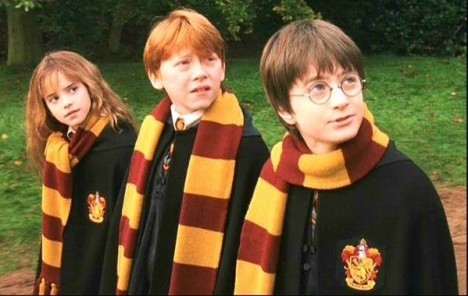
Even today, the first Harry Potter book remains one of my favorites of all time (though I think the third book is my favorite of all Harry Potters.)
John and I were so enchanted, that, upon finishing it, we immediately went out and bought the newest one…in hardback.
A huge investment for us, young parents that we were.
We decided to keep to our tradition of reading the book together. The second was just as good as the first one—with ghosts and taking diaries and a basilisk.
After Christmas, we discovered that a good friend had also discovered the wonder that was Harry Potter, after receiving the books for Christmas from his sister. And so our experience of sharing Harry Potter fandom began.
Then came more books…and movies.
And the video games.
Soon, not only were most of our friends fans of Harry Potter, the whole world knew who Harry was!
This charming story we had fallen in love with that Christmas had conquered the world.
So, when it was announced, in 2008, that the last Harry Potter book was coming out, Book Seven, I decided to do something daring. I would take my eight year old to the midnight release party.
Midnight was very late for him. But, I thought it was a once in a lifetime event. The kind of thing he might remember years later.
He didn’t make it until mid-night, if I recall. But he enjoyed the wonder and bustle. But I waited and I bought the book.
And then I took it home and John and I sat and read it aloud to each other until 5:00 the next day (whether we read until 5pm or the following 5am, I cannot recall.)
Why did we read non-stop, going nowhere, and pausing only to feed the children.
Let us jump back to the release of Book Six.
In some ways, Harry Potter and the Half-Blood Prince is the book I recall the best. There are two reasons for this:
1) Normally, we read the books together rather quickly. When this book came out, however, John was very busy at work, so we read something like a single chapter a day.
So I had a looooonnnnggg time to ponder every clue and every turn of the story.
I still remember being on my hands and knees in the hallway, scrubbing the tile of the floor (housecleaning project), thinking over each turn and twist of the story, wondering about it and trying to put the clues together.
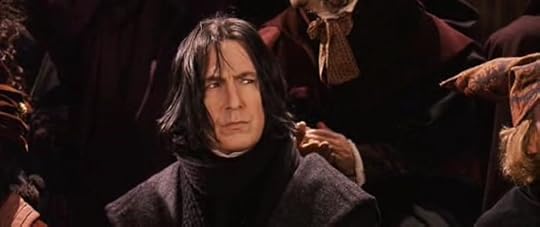
Who can explain why the oily Snape became so popular with moms?
2) Book Six. It was the one with all the secrets. All the real twists and turns. The day after it had come out, when we had hardly read any of it. John was getting his hair cut.
You know what barbers are like. You sit in a chair. They cover you with a cloth to keep the hair off your clothes. With the cloth in place you can’t raise your hands quickly to do things like…you know…
Stick your fingers in your ears.
John was sitting there, waiting for the trimming of his beard, (Yes, he does occasionally trim back the great, old-forest growth!) when the chipper DJs on MTV decided to announce the three great secrets of Harry Potter and the Half-Blood Prince: Who the Half-Blood Prince was, What beloved character died, and who killed him.
John desperately tried to cover his ears, but—trapped by the barber as he was—he never had a chance.
MTV…how could you?
Kindly, John did not share the secrets he had learned with me, but it cast a gloom over our reading experience. It is not nearly as much fun to spend hours wondering about the identity of the Half-Blood Prince when the person you are supposed to be in cahoots with already knows the answer.
So, when Book Seven came out, we decided that we would not leave the house or listen to the TV until we had read it. We ploughed through at such a dramatic pace that, to this day, I sometimes wonder if I might have missed part of it. (Actually, not to this day. The two part movie reminded me of the parts I might have forgotten…but there was a while there…)
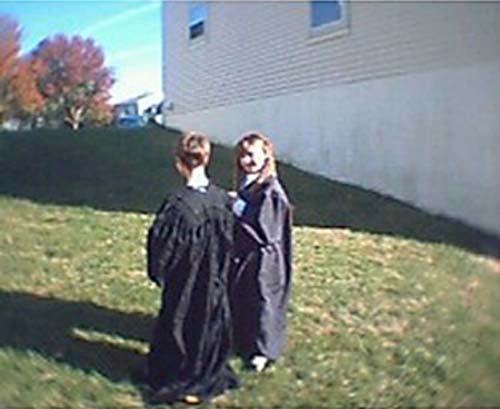
My eldest attending a friends Harry Potter birthday party.
He is wearing my grandmother's graduation robe from Cambridge,
which she attended in the 1920s.
New Harry Potter play coming out. New movie in the background. Rowling has write several other books, two of which I loved and one of which I found very painful to read, but very moving when I finally reached the end and understood it.
And, oh, of course…I suppose I should mention the three years of living hell playing a roleplaying game set some 20 years after the Battle of Hogwarts, which—despite the tremendous pain suffered by all four of the people involved with this game—I fell so in love with, as a story, that I threw aside everything else I had been doing and devoted the next five years of my life to transforming this painful, painful game into the best (non-Harry Potter) YA fantasy series I could make it.
 \
\
Note that Rachel is wearing the same robe as the picture above.
So, when it was announced that the new play would open 19 years after the official end of the previous series, I guess I could not help being mildly curious as to how it might turn out.
But it was a play. In London.
And they were only releasing a script.
I wasn’t really interested.
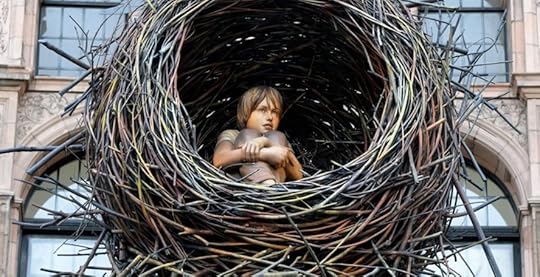
Outside the theatre in London where Cursed Child is playing.
J. K. Rowling asked those who saw the play before it formally opened to “keep the secret.” One online site told, though. They wrote out a description of the entire play. (Having now read the actual play, I must say that this sight offered the most spoilerific version of a spoiler ever known to man. They recorded EVERYTHING.)
I wasn’t that interested. Didn’t plan to read the new script, but…I clicked on the link.
The story was kind of dull and simplistic. Just little bits about Harry’s youngest son at school…
…until it wasn’t.
What started as a slow beginning suddenly was rolling down hill at Hogwart Express rates. There were twists and turns and unexpected reversals. Using portraits and dreams and other canon-established methods, the author had found astonishingly clever ways of bring onstage not only charming new characters, such as the Potter and Granger-Weasley children, but the dearly-departed ones as well.
At the end of the write-up, I sat blinking with wonder at the complexity and cleverness of the thing, how charming it was, and how well it rewarded Harry Potter fans, showing them things they wanted to see or had wondered about.
But…I still wasn’t really interested.
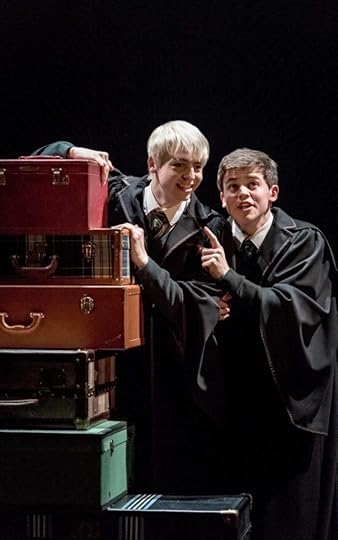
My favorite of the currently available shots from the London play.
Mainly, because the others look posed.
I mean…read a script?
Especially since everyone who had seen it agreed that the most amazing part was how fantastically high tech the production was in their special effects and scene changes. (There’s a montage scene. I have never seen a montage scene in a stage play before.)
So, what benefit would come from reading it?
Flash forward to Saturday night. It was around 8pm. I had gone to bed early for reasons after a difficult week, and I suddenly woke up and realized that:
Tonight was the night.
The Harry Potter and the Cursed Child was coming out.
Barnes and Nobles was having a midnight party.
We could go.
I mean, we didn't have to buy the book to enjoy the festivities, right?
It took until about 10:30pm for me to lever myself out of bed, find the appropriate Hogwarts robes for those who wanted them, and drive over to Barnes and Nobles.
On the way, I wondered if this gamble of a mid-night release party nine years later would pay off for B&B, Would anyone be there?
The first thing I noticed upon arriving was that the parking lot was packed.
Inside, costumed figures were everywhere. The line for the café went all the way to the front door…and it stayed nearly that long for the whole hour we were there. And inside, delights galore.
Nine years before, there had been a few kind of dull activities at the midnight release party. Now, nearly a decade and the rest of the movies later, all was wonder.
There was a sorting hat. a trolley witch selling treats, a wandmaking station, a ‘add-to-the-story” activity, potions games, as well as other stations we never investigated. Nearby stood a life-sized dementor with a sign that said FREE KISSES. There were Harry Potter books, and Harry Potter toys, and a 3-D puzzle of Hogwarts on display. And at the café, after the long, long wait, there was a poster on the wall—as official as all the others—for a Passion Potion drink, made just for this evening.
And everywhere, everywhere, were Harry Potter fans. Little boys with the round glasses and a scar on their forehead. Older boys in their Slytherin Quidditch robes. Girls dressed like Hermione or Cho Chang. Adults in witch hats or clever tee-shirts.
In line, in front of us, as we waited for our Passion Potion, was a young man in his twenties, clearly of the Wizarding world, who had carefully attempted to dress as a Muggle in order to join the festivities. Only he had sadly failed…his plaid pants not quite matching the patterns of his shirt, suit, and tie. Beside him was another young man (they both turned out to be software engineers) wearing a Pokemon TV. He enjoyed our conversation, but his face really lit up when he described his last month…living his childhood dream of actually catching Pokemon himself.
And somehow, the magic was all the more wonderful because Scholastic had finally, at long last, gotten it right—and released a new Rowlings book on July 31 – Harry Potter’s birthday!
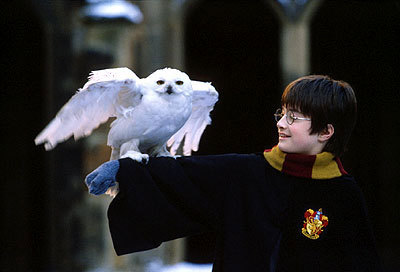
The first movie is still one of my all time favorite films.
As I stood amidst the enchantment and wonder, sipping my grande Passion Potion, I slowly realized:
A) My little eight year old was 17. My youngest was 13. He was taller, significantly in some cases, than many of the other children here.
That meant: many of the children who had come had been born after that fateful midnight in 2008 when Orville and I had last waited for a Harry Potter release.
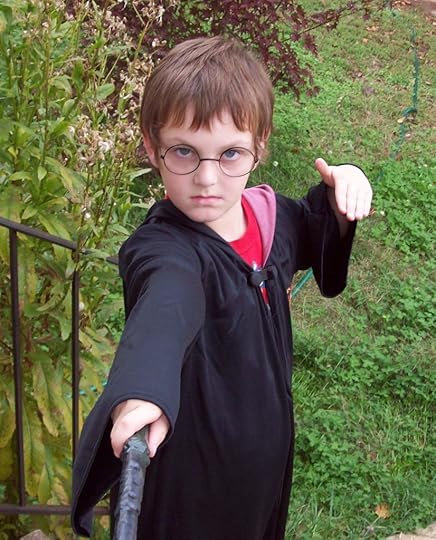
The Elf King, back before his wanted picture days.
This is the same Hogwarts robe he's wearing in the wanted picture.
B) While this was, by chance, the bookstore where I had first discovered Harry Potter, it was not the bookstore where Orville and I had waited 9 years before.
That store had been a Borders. It was gone now.
C) What an extraordinary impact J. K. Rowling’s orphan wizard boy had had upon the lives of, not only millions of readers all across the worlds – she has sold over 450 million books. That is one and a half books for every single man, woman, and child in America—but upon my own life, as an author, spending my days writing a series that—even if it was quite different from Harry Potter in mood and direction, had started life as a Hogwarts roleplaying game.
And I felt so happy.
…and so grateful.
And, suddenly, I did want to buy the book.
D) This was not 2008. I didn’t have to wait until midnight.
We left after about an hour, went home, got a good night’s sleep…and I bought the book on Kindle, for half the hardcover price…the next morning.

I have read the play now. It was an experience both bittersweet and joyous.
The strangest part was when there would be some hint of Christianity, such as the mention of a church, and I would remember suddenly that this was not Mark Whipple’s game version of future Hogwarts, where all monotheistic religions had been removed by magic from everyone’s memory.
The most amusing moment was chortling with joy when a character used flipendo. A favorite spell from the video game that never appeared in the books (and therefore Mark had not allowed us to use it in the game.)
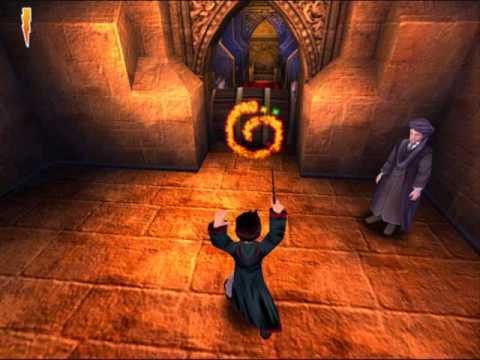
Flipen-do! Flip-endo!
Either way, it's so much fun to say!
Was the experience of reading a script worthwhile?
It was. Partially because it was Harry Potter.
Most fantasy worlds need lengthy description to make them come to life. But this was Hogwarts! We all know what everything looks like. We’ve read the books. We’ve seen the movies.
One funny thing was that without thinking about it, when reading, I pictured an older version of the movie Hermione in my mind, but for her daughter, Rose, I pictured the smart young woman playing Rose in the play. I didn't notice this mental discrepency until I came to a passage in the script that dealt with how much Hermione looked like her daughter.
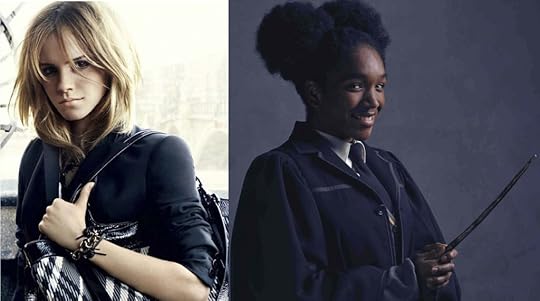
Hermione and Rose
My mental Hermione had longer, frizzier hair.
Of course, my two mental images didn't look anything like each other. But it did not interfere with my enjoyment of the play.
Did Harry Potter and the Cursed Child have any flaws?
A few. The writing was a bit simplified, too emotionally obvious—which might be signs of where Rowling’s original short story ended, and the scriptwriter’s dialogue began. But I bet that might be the script’s fault as well, Many of the slightly awkward lines, if said with humor or with deep emotion, would be hilarious or moving in the way that no short stage directions could make them.
Obviously, seeing the play—or even a filming of it—would be a much better option.
But, in the end, it was very enjoyable to read—even though I already knew the entire story.
And so, that was my weekend.
Didn’t end world hunger.
Didn’t save the universe.
But it did lift the spirits and bring joy.
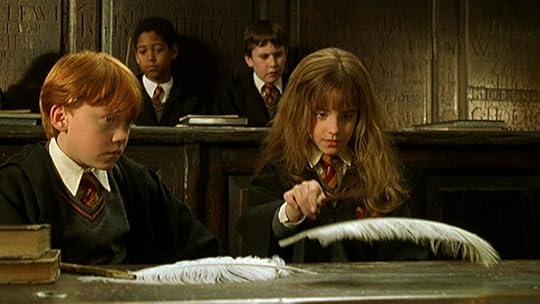
Ron and Hermione: Lifting spirits–and feathers–for nearly two decades.
God bless J. K. Rowling.
Long live The Boy Who Lived!
The Ideal Election

This is the most interesting and unnerving election that has happened in my lifetime. Unnerving for several reasons.
When I was young, my parents were very thoughtful and idealistic people. They instilled in me a wish to see our country have a president who was as great as some of the most noble men of the past. So each election, I have searched the candidates for someone who truly believed and lived the ideas for which he stands.
Sadly, such candidates never appeared.
Until this year.
This year, in a strange and miraculous change of direction, we had not one, but two such candidates: Ted Cruz and Bernie Sanders.
Whatever you might believe about these two men, their ideas really matter to them. They really believe what they stand for, and they stand for something concrete and obvious. They are willing to suffer and be ridiculed for what they believe.
Ted Cruz strikes me as kind of the Tim Tebow of politics. The Conservative Christians love him and very few other people seem to get him.
Bernie Sanders is just the kind of man I would have loved when I was a young liberal. Someone who is not part of the inner circle political elect, just a regular guy who believes what he says.
A contest between those two would have been interesting and strange, quite unlike any previous American election. However, it was not to be.
Enter the opposition:
Trump—an outsider known for his rudeness, his buffoonery, and his ability to stick his own foot deep into his mouth—who nonetheless won the hearts of hard-working Americans by recognizing and addressing topics that worry them but which the press and Washington will not address. Whether it’s immigrants, terrorism, or vaccinations, if the main-stream press dismisses it without serious discussion, Trump’s on it.
Trump is an outsider who was strongly rejected by the Republican party elite, who won his way to the nomination entirely upon a populist vote.
Clinton—an insider known for being corrupt, careless with state secrets, and, possibly, a murderess (by proxy, if not by her own hand)—brought to the table many years of practical experience. Solidly behind her is the press and the DNC insiders, the elite.
Clinton is an insider, chosen and raised to her current place of power by the Democratic elite, to the degree that they apparently colluded in interfering with the campaign of her opponents.
So, now we are stuck with a populist vs. an elitist candidate, neither of whom really seem to properly represent a large portion of their supposed constitutes—who are left wondering why they should bother voting at all.
Somehow, the current two party system doesn’t quite seem to be working the way most of us wish it would.
Are there other options? The Libertarian and the Green party are a bit larger than others, but as someone who has often voted Libertarian, I will just say: I’m not that happy with what they have to offer this year.
So I got to thinking: What would the ideal election be like?
Ideal as in, you know, barring things like political realities and promises candidates made not to go maverick.
And I thought, to me, the ideal election would be if somehow, miraculously, Bernie Sanders had accepted the offer to take over the candidacy for the Green Party, and Ted Cruz accepted the nomination for the Libertarians or maybe the Constitutional Party.
So our choices would be:

(It was really hard to find a picture of all four of these guys that didn't make at least one of them look really bad. Best I could do.)
Trump – populist, voicing the unvoiceable (both good and bad)
Clinton – bringing experience and Machiavellian cunning (both good and bad)
Cruz – offering a choice to those concerned with morals and principles.
Sanders – offering a choice for those who are socially progressive.
Now that would be an interesting election!!
***
Instead, we have: The Simpsons: "Go Ahead! Throw Your Vote Away!" — Now with Trump and Clinton!
(Alternate, slightly less topical and amusing version for those who can’t reach Facebook.)
The Simpsons: "Go Ahead! Throw Your Vote Away!"
May God have mercy on our souls!
July 20, 2016
Unexpected fans…the news you have been waiting for!
Quite a few of you have been asking for this for some time:
The Third Book of Unexptected Enlightenment!
On pre-order now!
Rachel and the Many-Splendored Dreamland
Release date: October 14, 2016
July 18, 2016
Book Bombs Away!
Summer Reading Needs!
The folks over at CLFA (Conservative Libertarian Fiction Alliance) have their first ever book bomb going today for 20 books.
This list includes books by myself, John C. Wright, and SuperversiveSF's own Ben Zwycky!
Books marked with an * were finalists in the CLFA Book of the Year contest (which was won by Larry Correia's Son of the Black Sword.)
You can find the list here.
Please share!


